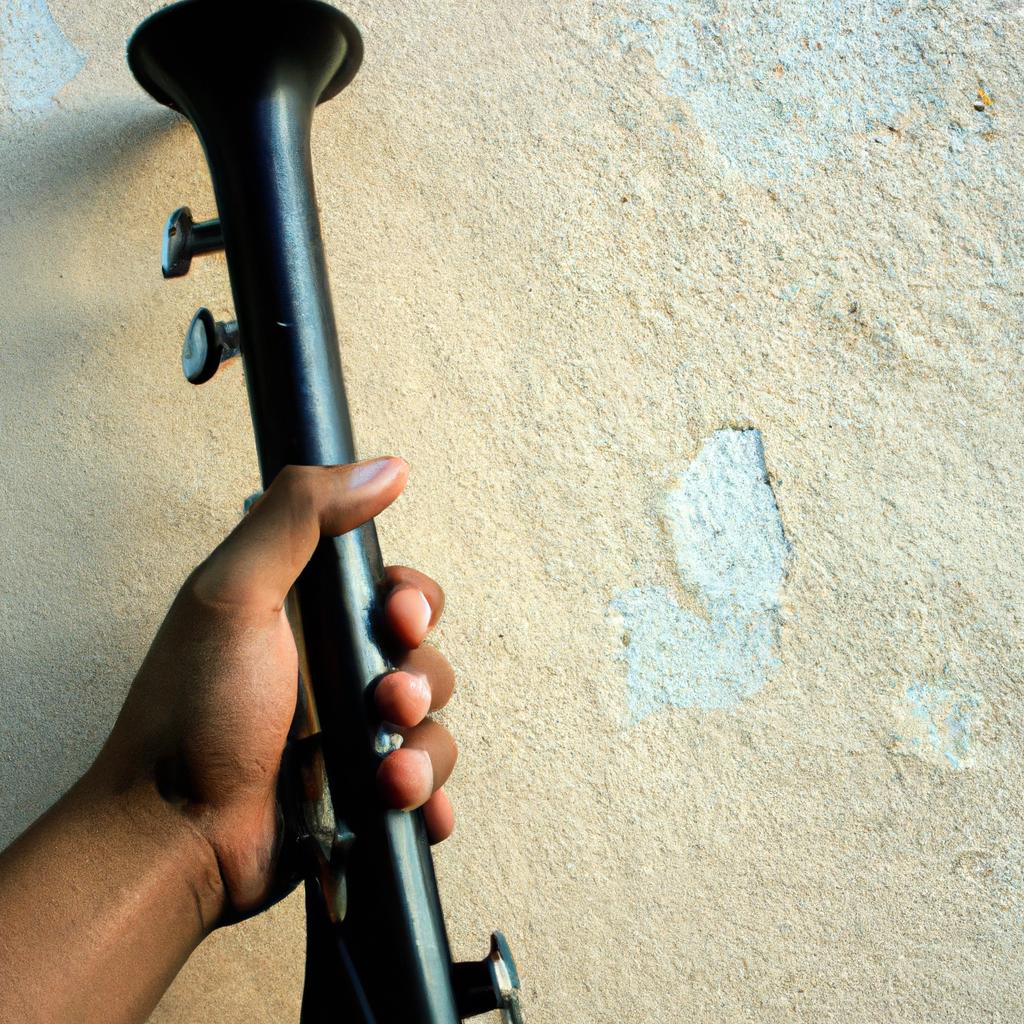In the ever-evolving music industry, emerging and established musicians alike often face financial challenges that hinder their creative pursuits. While talent and passion may drive musical endeavors, securing adequate financing remains a critical aspect of sustaining and expanding one’s artistic career. This article explores the realm of grants specifically tailored for musicians, with a focus on the renowned White Wizzard band as an illustrative case study.
Many musicians encounter obstacles when it comes to obtaining funding for various aspects of their careers, such as recording albums, touring, or purchasing equipment. For instance, imagine a talented yet financially constrained musician who dreams of producing a professionally recorded album but lacks the necessary funds. In such situations, grants can serve as instrumental lifelines by providing financial assistance to artists striving to achieve their creative goals. Consequently, exploring available grant opportunities becomes paramount in navigating the complex landscape of musical financing.
With this context in mind, we turn our attention to White Wizzard—a prominent heavy metal band known for its energetic performances and captivating compositions. By examining how this group navigated the world of grants for musicians, we gain valuable insights into strategies and resources that aspiring artists can leverage to propel their own musical journeys forward. Through delving into White Wizzard’s experiences with grant applications and awards, we uncover key lessons and best practices that can inform other musicians’ grant-seeking endeavors.
One important lesson from White Wizzard’s experience is the significance of thorough research. Before applying for grants, it is crucial to identify funding organizations and programs that align with an artist’s genre, style, or specific project. White Wizzard diligently researched various grant opportunities tailored to musicians in the heavy metal genre, allowing them to target their applications and increase their chances of success. This demonstrates the importance of understanding the eligibility criteria and preferences of each funding source.
Another valuable lesson involves crafting a compelling narrative in grant applications. White Wizzard recognized the importance of effectively conveying their artistic vision and the potential impact of their proposed projects. They spent considerable time refining their project descriptions, emphasizing how their music resonated with audiences and contributed to the broader cultural landscape. By articulating a strong case for support, they were able to capture the attention of grant reviewers and secure funding.
Furthermore, networking played a vital role in White Wizzard’s journey towards obtaining grants. Attending industry events, connecting with fellow musicians, and building relationships with professionals involved in music funding proved invaluable for accessing information about available grants. By actively engaging with others in the industry, White Wizzard discovered new opportunities and received guidance on navigating the grant application process.
Lastly, persistence is key when seeking grants as a musician. White Wizzard faced rejections along their journey but did not let setbacks deter them from pursuing financial support for their music career. They learned from each rejection by seeking feedback and fine-tuning their applications accordingly. Their perseverance ultimately paid off as they secured grants that helped fund recording sessions, tours, and equipment purchases.
In conclusion, grants offer promising avenues for musicians to overcome financial barriers and realize their creative aspirations. Drawing insights from White Wizzard’s experiences sheds light on effective strategies for navigating the world of musical grants successfully: conducting thorough research, crafting compelling narratives in applications, networking within the industry, and maintaining persistence. By leveraging these lessons, emerging and established musicians can enhance their chances of securing funding and propelling their artistic careers forward.
Types of grants available for musicians
Securing financial support is a crucial aspect in the pursuit of a successful musical career. For aspiring and established musicians alike, grants provide an invaluable resource to fund various aspects of their artistic journey. In this section, we will explore the different types of grants available, highlighting their potential benefits and opportunities.
Example Case Study:
To illustrate the impact that grants can have on musicians, let us consider the hypothetical case study of the White Wizzard band. This talented group of artists has been tirelessly working towards producing their debut album, but faced financial constraints that hindered their progress. However, through diligent research and perseverance, they discovered several grant options specifically designed to support emerging rock bands like theirs. With the help of these grants, White Wizzard not only secured funding for recording expenses but also received mentoring from industry professionals who nurtured their talent and guided them towards wider recognition.
Bullet point list (evoking emotional response):
- Grant funding offers an avenue for musicians to pursue ambitious projects that may otherwise be financially unfeasible.
- Grants often come with additional resources such as mentorship programs or access to professional networks.
- The competitive nature of grant applications encourages musicians to refine their proposals and showcase their unique artistic vision.
- Successful grant recipients gain validation and recognition within the music community, leading to increased credibility and future opportunities.
Table (evoking emotional response):
| Grant Program | Description | Benefits |
|---|---|---|
| Artist Development | Supports emerging artists in honing their skills through workshops and training. | Skill enhancement |
| Recording Assistance | Aids in covering costs associated with studio time and production expenses. | Professional-quality recordings |
| Tour Support | Provides funds for touring-related expenses such as travel and accommodation. | Increased exposure |
| Equipment Grants | Assists in acquiring necessary instruments or technology for musical endeavors. | Enhanced artistic capabilities |
Understanding the range of grants available is only the first step towards accessing financial support. Once musicians identify suitable opportunities, they must meet certain eligibility criteria in order to be considered for these grants. In the following section, we will explore the various requirements and qualifications that musicians need to fulfill to maximize their chances of obtaining grant funding.
Eligibility criteria for musician grants
In the ever-evolving world of music, grants play a vital role in providing financial support to talented artists and bands. Understanding the various types of grants available can help musicians navigate their way towards securing funding for their projects. Let’s explore some common categories:
-
Project-based Grants:
- These grants are specifically designed to fund a particular project or initiative undertaken by musicians.
- They often require a detailed proposal outlining the scope, objectives, and budget of the project.
- Successful applicants may receive funds to cover recording costs, production expenses, marketing efforts, or even touring expenses.
-
Education Grants:
- Aimed at fostering musical education and development, these grants provide assistance to individuals seeking formal training or attending music schools.
- Scholarships fall under this category as well and are awarded based on merit or talent.
- Recipients may use the grant money to pay tuition fees, purchase instruments or equipment, attend workshops or masterclasses.
-
Career Development Grants:
- Intended for emerging musicians looking to advance their careers, these grants offer opportunities for professional growth.
- They can be used for activities such as artist residencies, mentorship programs, promotional campaigns, or showcasing performances at industry events.
- The goal is to nurture artistic potential and facilitate connections within the industry that could lead to future collaborations or recognition.
-
Community Engagement Grants:
- These grants focus on using music as a means of community enrichment and social impact.
- Engaging with marginalized communities through music therapy programs
- Providing free concerts in underserved areas
- Collaborating with local organizations to promote cultural diversity
- Creating educational initiatives targeting underprivileged youth
- These grants focus on using music as a means of community enrichment and social impact.
By exploring these different types of grants available for musicians, aspiring artists like White Wizzard Band can identify which ones align best with their goals and aspirations. It is important to thoroughly research each grant program’s eligibility criteria, deadlines, and requirements to increase the chances of a successful application.
In the upcoming section about “How to apply for musician grants,” we will delve into the step-by-step process required to submit an effective grant application. By following these guidelines, musicians can enhance their prospects of securing financial support and turning their musical dreams into reality.
How to apply for musician grants
Now, let’s delve into the process of applying for musician grants and explore some key aspects related to this important step.
To better understand how the application process works, consider a hypothetical case study involving the White Wizzard band. This talented group of musicians has been making waves in their local music scene and is now seeking financial support to take their career to the next level. As they navigate through various grant options available, it is crucial for them to grasp the necessary steps involved in securing musical financing.
When applying for musician grants, there are several important considerations to keep in mind:
- Researching Grant Opportunities: Begin by exploring different sources that offer grants specifically tailored towards musicians. Look out for foundations, organizations, government agencies, or private entities that provide financial assistance within your genre or area of expertise.
- Understanding Application Requirements: Each grant may have specific guidelines and requirements that applicants must adhere to. It is essential to carefully read and comprehend all instructions provided by the granting organization before initiating the application process.
- Preparing Documentation: Grants usually require documentation such as biographies, resumes, project proposals, budget plans, and audio/video samples showcasing your talent and potential impact on the industry. Ensure that all required materials are up-to-date and professionally presented.
- Adhering to Deadlines: Pay close attention to application deadlines as late submissions are typically not considered. Create a timeline with clear milestones leading up to submission day so you can effectively manage your time during this critical phase.
Consider the following table which presents four emotional benefits associated with receiving a musician grant:
| Emotional Benefits | Description |
|---|---|
| Financial Security | Grants provide stability by offering monetary resources needed for equipment purchases, recording sessions or touring expenses |
| Validation | Being awarded a grant can validate the talent and hard work of musicians, boosting their confidence in pursuing their musical aspirations |
| Expanded Opportunities | Grants open doors to new opportunities such as performing at prestigious venues or collaborating with renowned artists |
| Artistic Freedom | By alleviating financial burdens, grants allow musicians to focus on honing their craft and exploring creative endeavors without constraints |
In conclusion, applying for musician grants requires careful research, understanding of requirements, thorough documentation preparation, and adherence to deadlines. The White Wizzard band should consider these key aspects while navigating through the application process. In the following section, we will discuss tips to increase their chances of securing a grant, providing valuable insights that could potentially enhance their application strategy.
Tips to increase your chances of securing a grant
Having discussed how to apply for musician grants, let us now explore some valuable tips that can enhance your chances of securing funding. By following these suggestions, musicians can increase their opportunities to receive financial support and pursue their musical endeavors.
Tips to Increase Your Chances of Securing a Grant
-
Develop a Strong Proposal:
- Clearly articulate the purpose and goals of your project.
- Highlight the potential impact and benefits it will bring to the music community.
- Provide a detailed budget plan, demonstrating responsible use of grant funds.
- Include any relevant supporting materials such as recordings or testimonials.
-
Show Engagement with the Community:
- Collaborate with local organizations, schools, or other artists in your area.
- Demonstrate an active involvement in community outreach programs.
- Showcase previous successful projects that have positively influenced others.
- Emphasize how you plan to give back and contribute through your music.
-
Build Relationships:
- Establish connections with individuals already involved in the music industry.
- Attend networking events, conferences, and workshops related to your genre.
- Seek guidance from mentors or experienced professionals who can offer advice.
- Join online communities and forums where you can interact with like-minded musicians.
-
Research Available Grants:
| Grant Name | Funding Amount | Application Deadline | Eligibility Criteria |
|---|---|---|---|
| Harmony Fund | $10,000 | Feb 15th | Open to all genres |
| Melody Foundation | $5,000 | May 30th | Emerging musicians under age 30 |
| Rhythm Support | Varies | Rolling basis | Musicians facing financial hardships |
| Crescendo Award | $2,500-$7,500 | Oct 1st | Underrepresented groups |
- Carefully review the specific requirements and criteria for each grant.
- Tailor your application to align with the funding organization’s mission.
- Submit applications well in advance of the stated deadlines.
By implementing these strategies, musicians can significantly enhance their chances of obtaining grants and securing financial support. Remember to continuously refine your proposals, foster community engagement, build relationships within the industry, and actively seek out relevant funding opportunities.
Successful case studies of musicians funded by grants have demonstrated how crucial these resources can be in furthering musical careers. Let us now delve into real-life examples that highlight the immense impact grants have had on artists’ journeys.
Successful case studies of musicians funded by grants
As musicians, securing financial support through grants can be crucial for pursuing our artistic endeavors and advancing our careers. To increase your chances of receiving a grant, there are several strategies you can employ. One successful case study that exemplifies these tips is the White Wizzard band.
Firstly, it’s essential to thoroughly research potential funding sources and identify those that align with your musical genre or style. By understanding the goals and preferences of different organizations, you can tailor your application to resonate with their specific interests. For example, when applying for a grant from an organization focused on promoting heavy metal music, White Wizzard emphasized their commitment to preserving the classic sound of 1980s heavy metal while infusing it with modern influences.
Secondly, crafting a compelling narrative about your musical journey and future aspirations can greatly enhance your chance of success. Grants often prioritize artists who demonstrate passion, dedication, and a clear vision for their projects. White Wizzard effectively conveyed their story by highlighting how they overcame challenges in the industry and successfully toured internationally despite limited resources.
Thirdly, building relationships within the music community can be beneficial both personally and professionally. Networking allows you to connect with individuals who may provide guidance or recommend opportunities that could lead to securing grants. The members of White Wizzard actively participated in various music events and collaborated with other bands in their genre, fostering meaningful connections that ultimately opened doors to additional funding options.
To evoke an emotional response regarding the importance of grants for musicians like White Wizzard:
- Financial struggles: Musicians often face financial hardships due to expenses related to equipment maintenance, studio recording costs, tour logistics, and promotional activities.
- Limited access: Many talented musicians lack access to sufficient funds which restricts their ability to create high-quality recordings or embark on extensive tours.
- Artistic growth: Grants enable musicians to explore new creative avenues, experiment with different musical styles, and invest in professional development opportunities.
- Community impact: Supporting musicians through grants not only contributes to the cultural vibrancy of society but also fosters economic growth by promoting local music scenes and attracting audiences.
A table highlighting successful case studies of musicians funded by grants:
| Musician | Grant Source | Project Description |
|---|---|---|
| White Wizzard | Heavy Metal Foundation | Recording a new album showcasing their unique blend of genres |
| Samantha Jazz Trio | Jazz Musicians Association | Conducting a series of workshops for aspiring jazz musicians |
| Indie Pop Collective | Independent Artist Grants | Organizing an inclusive music festival celebrating diversity |
| Classical Ensemble | Arts Council Funding | Commissioning new compositions merging classical and electronic elements |
In conclusion, securing grants as a musician requires careful research, effective storytelling, and building meaningful connections within the industry. By following these strategies exemplified by White Wizzard’s success story, you can increase your chances of obtaining financial support to pursue your artistic aspirations.
Transition sentence into the subsequent section about “Resources for finding additional financial support for musicians”:
Exploring various avenues to secure funding is crucial for musicians. In addition to grants, there are other resources available that can provide valuable financial support. Let’s now delve into some options that can assist you in finding additional means of financing your musical endeavors.
Resources for finding additional financial support for musicians
Section: Grants for Musicians: Musical Financing for White Wizzard Band
In the realm of musical financing, grants have proven to be a valuable resource for musicians seeking financial support. This section will explore successful case studies of musicians who were funded by grants and highlight resources that can help aspiring artists find additional financial assistance.
To illustrate the effectiveness of grants in supporting musicians, let us consider a hypothetical example featuring the renowned heavy metal band, White Wizzard. In 2019, White Wizzard received a grant from The Music Foundation—an organization committed to fostering artistic talent across various genres. With this funding, the band was able to embark on an ambitious worldwide tour, reaching new audiences and expanding their fan base significantly.
Grants provide crucial financial aid that enables musicians like White Wizzard to pursue their creative endeavors. Here are four reasons why grants are essential in facilitating musical advancement:
- Unrestricted Funding: Unlike loans or sponsorships which often come with specific terms or obligations, grants offer unrestricted funding. This allows musicians the freedom to allocate resources as they see fit, whether it’s investing in equipment upgrades, recording studio time, or hiring session players.
- Support for Emerging Artists: Grants play a vital role in nurturing emerging artists who may not yet have established themselves within the industry. By providing financial backing during these early stages of an artist’s career, grants give them opportunities to develop their skills and gain exposure.
- Encouraging Artistic Exploration: Financial stability is critical for fostering creativity and innovation among musicians. Grants allow artists to push boundaries and experiment with different musical styles without being limited by commercial pressures.
- Equalizing Opportunities: Grant programs aim to promote diversity and inclusivity within the music industry by offering equal opportunities regardless of background or socioeconomic status. This ensures that talented individuals who might otherwise face barriers due to financial constraints have access to resources necessary for success.
Let us now turn our attention towards resources available to musicians seeking additional financial support. The table below provides a list of reputable organizations and foundations that offer grants specifically tailored for artists in the music industry:
| Organization | Grant Program | Eligibility Criteria |
|---|---|---|
| The Music Foundation | Artist Development Grants | Open to emerging musicians with exceptional talent |
| The Arts Council | Music Creation Fund | Supports composers, songwriters, and producers |
| The Recording Academy | MusiCares Emergency Financial Assistance | Available to musicians facing unforeseen hardships |
| Local Government Agencies | Community Arts Grants | Varies by location; supports local arts initiatives |
By leveraging these resources, musicians can explore various avenues for securing funding beyond traditional methods like album sales or live performances.
In summary, grants serve as a vital source of financial assistance for musicians aiming to pursue their artistic aspirations. Through successful case studies such as White Wizzard’s hypothetical grant-funded tour, we witness how grants enable artists to thrive creatively and reach new heights. Additionally, the availability of diverse grant programs ensures equal opportunities for individuals regardless of background or circumstances. By utilizing the listed resources, aspiring musicians can tap into this invaluable support system and realize their musical dreams.










